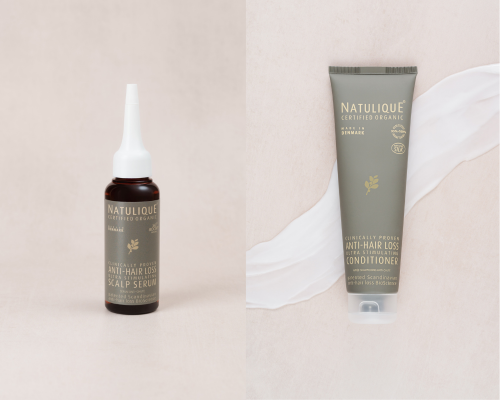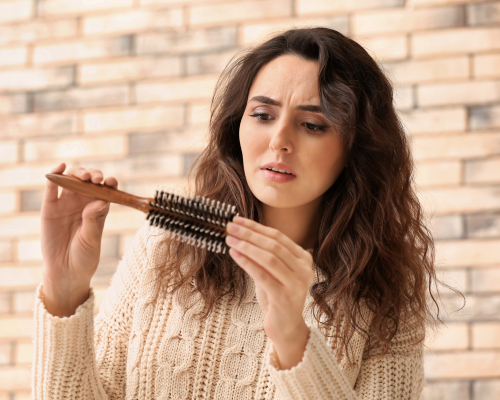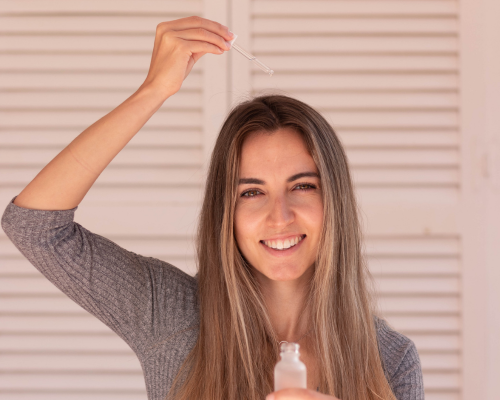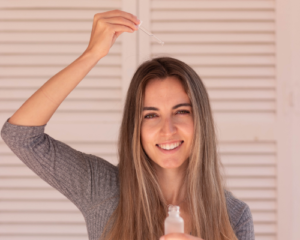Introduction - Why do we lose more hair in autumn?
Hair loss is a phenomenon that intrigues and worries many people, especially when it seems to intensify at a specific time of year: autumn. To understand why hair loss is more frequent in autumn, we need to explore the various natural and biological factors that contribute to this situation.
The natural phenomenon of hair loss
The hair life cycle
Each hair follows a natural life cycle made up of three distinct phases: the anagen phase (growth), the catagen phase (regression) and the telogen phase (rest). At any given moment, every hair is in one of these phases. On average, a person loses between 50 and 100 hairs a day, which is considered normal. However, in autumn, this number can temporarily increase, giving the impression of excessive hair loss.
Seasonality of hair loss
Several studies suggest that hair loss naturally increases in autumn, following a summer growth peak. This cycle may have ancestral roots, where the human body was programmed to adapt its hair growth to climatic conditions and sun exposure, in particular to protect the scalp from summer's more intense ultraviolet rays.
Understanding the specific factors of autumn hair loss
Environmental changes
Environmental changes play a crucial role in the intensification of hair loss during autumn. The transition from warmer to cooler autumn temperatures can stress the scalp and hair follicles, leading to increased hair loss.
The impact of temperature changes on the scalp
The drop in temperature and humidity can dry out the scalp, making hair more fragile and prone to falling out. What's more, frequent switching between heated indoor environments and cooler outdoor air can exacerbate stress on the scalp and hair.
The effects of UV rays in summer
Although summer UV rays are often associated with skin damage, they can also directly affect the scalp. Intense exposure to UVA and UVB rays can weaken hair follicles, making hair more vulnerable to falling out as it enters the telogen phase, resulting in a noticeable increase in autumn.
Biological changes
The hormonal reaction to the change of season
Seasonal changes also influence our body's hormonal production. Variations in the secretion of certain hormones, such as melatonin and prolactin, can influence the hair cycle and contribute to more pronounced hair loss in autumn.
Adapting the hair cycle to autumn
As autumn sets in, the hair cycle adjusts, which can lead to a temporary increase in hair loss. This adaptation may be an evolutionary remnant of the body's need to preserve its energy and resources for the harsher winter months ahead.
In summary, increased hair loss in autumn is often the result of the convergence of various environmental and biological factors that naturally influence the hair cycle. Understanding these phenomena can help you better manage the anxiety associated with seasonal hair loss.
The psychological consequences of increased hair loss
Apprehension and anxiety about autumn hair loss
How do you interpret normal or excessive hair loss?
It can be difficult to distinguish between normal and excessive hair loss, especially during seasonal changes. In autumn, the perception of losing more hair can cause concern and anxiety. However, to determine whether the loss is excessive, it's important to observe a few basic signs: loss of large quantities of hair in a short space of time, visible thinning of the hair or bald patches. If such signs appear, it may be necessary to consult a professional.
Impact on self-esteem
Hair loss can have a major impact on self-esteem. Our appearance often plays a fundamental role in how we perceive ourselves and the confidence we have in ourselves. So a visible increase in hair loss can lead to feelings of embarrassment, frustration and even shame. Those affected may feel the need to hide their hair loss, avoid social situations, or seek remedies to combat the phenomenon.
Busting the myth: autumnal hair loss vs. baldness
The main differences between seasonal loss and baldness
It's essential to distinguish seasonal hair loss from permanent baldness. Autumn hair loss is generally temporary, and is often the result of climatic and hormonal changes. On the other hand, baldness, whether genetic in origin or linked to other factors such as stress or certain illnesses, is an ongoing, progressive process. Unlike baldness, the amount of hair lost during seasonal hair loss does not usually lead to permanent bald patches or hair recession.
Understanding these differences is crucial to avoiding excessive anxiety about autumnal hair loss. It's a temporary period, and once the hair cycle adapts to the new seasonal conditions, most individuals find that loss gradually diminishes over time.
The importance of stress management
Although seasonal hair loss is often natural and temporary, emotional stress can exacerbate the situation. Adopting stress management techniques, such as meditation, yoga or regular exercise, can help alleviate the anxiety associated with hair loss. Maintaining a balanced diet, rich in vitamins and minerals, is also essential to support hair health.
Ultimately, it's important to remember that autumnal hair loss, while distressing, is a normal and natural part of the hair cycle for many. Educating yourself on the subject and understanding the underlying mechanisms can help reduce apprehension and adopt a more serene approach to this seasonal phenomenon.
See also: Why is moisturizing essential for curly hair?
Solutions to reduce autumn hair loss
Changing your hair care habits
Adopt a hair routine adapted to the season
To minimize autumn hair loss, it's crucial to modify your hair routine. Choosing gentle, sulfate-free shampoos to avoid drying out the scalp is an important first step. Opt for products enriched with essential nutrients, such as keratin, silk proteins or argan oil, which can strengthen hair and reduce breakage.
The importance of moisturizing and nourishing oils
With the change of season, moisturizing the scalp becomes essential. Using moisturizing hair masks once or twice a week can greatly strengthen strands and improve their resistance. Similarly, the application of natural oils, such as coconut oil or sweet almond oil, can help seal in moisture to the hair fiber and prevent dryness.
Adopt a healthy, balanced diet
Eat foods rich in hair nutrients
A well-balanced diet is essential for strong, healthy hair growth. Include foods rich in vitamins A, C, D and E in your daily meals, as they play a key role in maintaining healthy hair. Foods such as spinach, eggs, nuts and oily fish like salmon can provide the fatty acids and antioxidants needed to strengthen hair follicles.
The impact of hair supplements
If your diet isn't sufficient to provide all the nutrients you need, consider taking hair supplements. Supplements containing biotin, zinc, iron and amino acids can greatly improve hair anchorage and naturally reduce seasonal hair loss. Be sure to consult a healthcare professional before starting any supplement to assess your specific needs.
Practice stress reduction techniques
Integrate relaxation activities into your daily routine
Stress is an often overlooked but significant factor in hair loss. To manage it effectively, incorporating relaxation activities such as meditation, yoga or nature walks can have a beneficial effect on general well-being and hair health. Taking time out for yourself and relaxing can prevent stress-induced hair loss from increasing.
The positive impact of regular exercise
Regular exercise benefits not only the body, but also the scalp. By stimulating blood circulation, physical activity promotes better oxygenation of hair roots and an optimized supply of nutrients. Moderate exercise such as brisk walking, swimming or cycling at least three times a week can help reduce hair loss.
Consult a hair care professional
Assessing the need for specialized treatment
When faced with persistent or excessive hair loss, consulting a dermatologist or hair specialist may be necessary. These professionals can carry out a full assessment and suggest treatments such as mesotherapy, light therapy or platelet-rich plasma injections to stimulate hair growth.
Alternative therapies and their role
Finally, exploring alternative therapies such as acupuncture or homeopathy may also be considered. Although scientific evidence is limited regarding their effectiveness, some people find these approaches beneficial for boosting hair health and minimizing seasonal hair loss in autumn.
Preventing hair loss in autumn: practical tips and FAQs
Adapt your skincare routine to the season
Soften your hair routine
Choose loose hairstyles to reduce tension on the scalp and hair follicles. Avoid tight clips and elastics, which can accentuate breakage and hair loss.
Limit the use of heating appliances
Heated appliances such as straightening irons, hair dryers and curling irons can weaken hair. Opt for low temperatures and don't forget to use a thermal protector before any use.
Lifestyle strategies for better hair health
Optimizing sleep
Quality sleep is essential for cell regeneration, including hair cells. Try to maintain a regular sleep routine and make sure you get between 7 and 9 hours of rest a night.
Hydration and stress management
Staying well hydrated is crucial to overall health, including that of the scalp. At the same time, developing relaxation techniques, such as meditation and deep breathing, helps reduce stress levels that can influence hair loss.
Frequently asked questions (FAQ)
Is it normal to lose more hair in autumn?
Yes, it's usual to see an increase in hair loss in autumn due to environmental and biological factors.
How long does seasonal hair loss last?
Seasonal hair loss usually lasts a few weeks, during which the hair cycle adapts to the change of season.
Should I worry if I notice more hair on my pillow?
There's no cause for immediate alarm, unless hair loss is gradually increasing or you notice significant thinning.
Which foods promote healthy hair?
Foods rich in vitamins, minerals and essential fatty acids, such as spinach, avocados, eggs and nuts, promote good hair health.
Should I use dietary supplements to prevent hair loss?
If your diet doesn't cover your nutritional needs, food supplements can be useful, but should only be taken on the recommendation of a healthcare professional.





